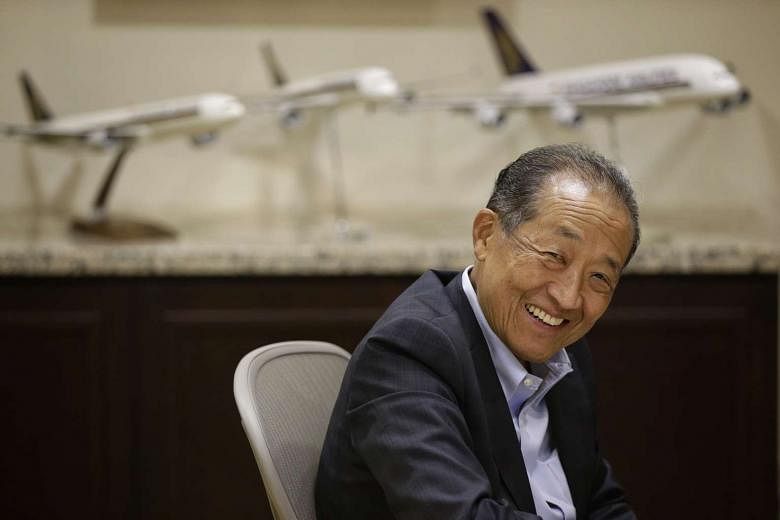Singapore Airlines (SIA) is world famous as a premium brand, with its Singapore Girl and service putting it constantly among top-ranked airlines. Yet, the main growth in air travel, especially in Asia, is driven by no-frills, budget flights.
So how does SIA maintain its premium edge and, at the same time, carve itself an increasingly bigger slice of the budget dollar? That, says outgoing chairman Stephen Lee, is a conundrum that has occupied SIA and will continue to do so.
One answer has been to start Scoot - a wholly owned budget carrier focusing on medium- and long-haul flights - in mid-2012. But taking this plunge after 40 years of flying high as a premium carrier required more than a year of soul-searching for the company, he revealed to The Sunday Times.
Would it dilute SIA's brand, being behind a budget carrier? Would it cannibalise the premium business? Would it confuse customers?
In a 90-minute interview, his first since becoming chairman in 2006, Mr Lee said: "The board members needed to go through those key issues and convince themselves. It (the decision to start Scoot) was not a very easy and obvious one."
Scoot, which now has a fleet of 12 Boeing 787 aircraft, was not SIA's first foray into budget travel. In 2003, it took a 49 per cent stake in Tigerair, which launched in September 2004, but SIA was not involved in running it.
In just over a decade, Asian budget carriers have gone from an almost-zero presence to carrying 31 per cent of global budget travellers last year, with Asia accounting for much of the growth.
Budget carriers already account for almost 60 per cent of all intra-South-east Asian travel.
Before Scoot was launched, the SIA board was "already very concerned about the rapid growth of the low-cost carriers", said Mr Lee, who will step down as chairman on Jan 1.
Discussions centred around how SIA, as an established full-service premier airline, could take part in the growth, and indeed, whether it wanted to.
With deep-pocketed Middle Eastern carriers like Dubai's Emirates expanding aggressively, supply was quickly outstripping demand, which eventually brought fares and yields down. At the other end of the spectrum, low-cost carriers like AirAsia, Jetstar and Lion Air were eating into SIA's regional business.
From a high of $2 billion in 2008, just before the global financial crisis struck, annual group profits plunged to $1.1 billion in the year ending March 2011, and to $368 million last year.
Squeezed at both ends, SIA went ahead with Scoot, took over Tigerair in March this year and recently announced that both carriers will become one when Tigerair is subsumed under the Scoot brand late next year.
This will reduce consumer confusion and pave the way for Scoot to work more closely with SIA and the group's regional arm, SilkAir, to bring more people to and through the Changi Airport hub.
This year, profits rose to $804 million for the 12 months to March 31.
Challenges will remain but "we have positioned ourselves to be able to compete successfully and we have the right tools in the box", Mr Lee said, when asked to highlight key achievements during his tenure.
For the first time in many years, SIA also has the right aircraft: the Airbus 350 which offers lower operating costs for long-haul flights than other similar-sized planes in SIA's fleet. This has allowed SIA - which has bought 67 of the planes - to expand into new markets, including launching non-stop flights from Singapore to San Francisco in October.
Even as SIA plans to pursue both markets, growth in the budget segment will outpace the demand for premium long-haul flights, analysts said. The question is what impact this will have in SIA's books.
Today, 80 per cent of SIA's revenue comes from the full-service business. "It will be different... It can be quite different" in the future, Mr Lee said, though he declined to speculate further.
According to aviation analyst Shukor Yusof of Endau Analytics, SIA will continue to focus on premium "because it still exists and will remain key for SIA's bottom line...
"But the business will never be as profitable as it was before, perhaps even a lot less. That said, full service will still continue to be SIA's bread and butter 10 years from now - easily 60 per cent to 65 per cent of annual turnover."
A key factor in the equation is how successful SIA will be in engaging the next generation of travellers, Mr Lee said - in particular those between the ages of about 18 and 30.
"What does the brand mean to them? I'm not sure that when they become financially more secure they will automatically move on to premium travel. This is a group that might have grown up with low-cost carriers, so how we engage them will be a critical success factor," he stressed.
SIA must give customers what they want "rather than we go and design the product and expect the market to follow us", he added.
"The challenges going forward are many... Whether SIA will be successful will depend on how quickly we can adjust to demand changes and whether we have the foresight to see what others cannot see.
"It will please me to see SIA succeed beyond what we've achieved today, continue to be the iconic company that it is and continue to be a leader in the industry.
"I have done what I can during my stint. It's now time for Peter to take the company forward... I will be a great cheerleader, albeit from the sidelines."
Mr Peter Seah, currently SIA deputy chairman and chairman of DBS Group Holdings, will succeed Mr Lee on Jan 1.
Competition will get tougher but SIA will fight, Mr Lee said.
With a 49 per cent stake in Indian carrier Vistara and 23 per cent in Virgin Australia, SIA is also benefiting from growth in other key markets.
One regret is failure to penetrate the Chinese market, including foiled plans to take a stake in China Eastern Airlines.
"We tried...," Mr Lee said wistfully. "We were not successful."


